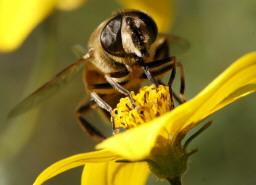The widespread use of pesticides is decimating Italy's honeybee population and costing millions of euros in lost crops, beekeepers and farmers warned on Tuesday.
The Union of Italian Beekeepers (UNAAPI) and leading agricultural association Coldiretti both sounded the alarm over a mass die-off among Italian bees over the last year that would cost farmers 2.5 billion euros.
Referring to a ''silent epidemic'', UNAAPI said between 40% and 50% of Italy's honeybees had vanished since the start of last year.
''A group of comparatively new pesticides called neonicotinoids are killing the bees,'' said UNAAPI President Francesco Panella. ''These substances were irresponsibly authorized by public powers that bowed to pressure from the chemical industry''.
Recalling that Italian agriculture uses over a third of all pesticides applied in Europe, he added: ''Bees are extremely fragile.
''They are excellent indicators of levels of toxicity in the environment. What they tell us should be taken on board with great concern for the survival of future generations''.
UNAAPI accepts that drought and disease have also played a role in the mysterious die-off but insists that the key suspect is a seed treatment using neonicotinoids, an artificial form of nicotine.
A number of studies have linked neonicotinoids to die-offs in bee colonies. Some have suggested the insecticide leads bees to stop feeding larvae and results in a breakdown of their navigational abilities.
Although scientific conclusions have been mixed, Germany banned the use of all neonicotinoid-based pesticides two months ago, while France imposed strict limits on their use on bee crops following mass die-offs in the 1990s.
The pro-technology agricultural association FUTURAGRA, however, rejected claims that neonicotinoids were to blame and stressed that banning the new pesticide would cause serious harm to maize harvests.









